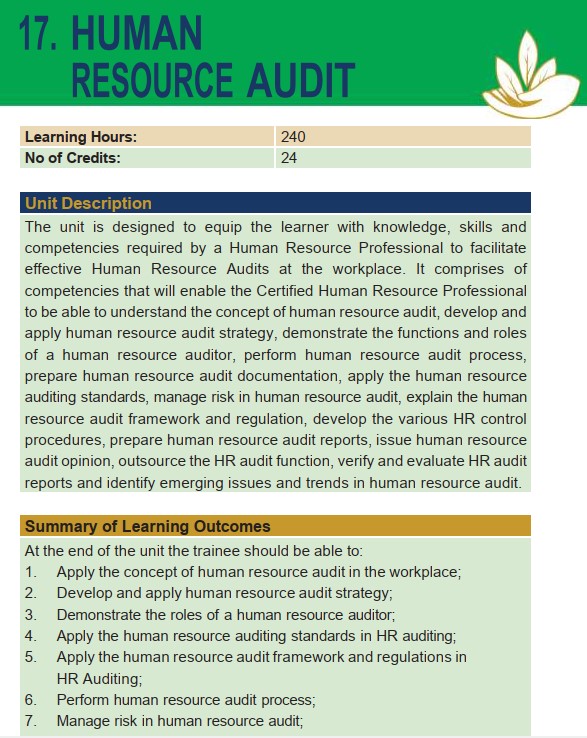
Topics
1. Introduction to Human resource Consultancy
1.1 Nature and purpose of HR consultancy
1.2 Development of HR consultancy in Kenya
1.3 Principles of HR consultancy
1.4 Models of consultancy
1.5 Qualities of an HR consultant
1.6 HR consulting skills
1.7 Obligations and duties of an HR consultant
1.8 Areas of HR consultancy
1.9 HR consultancy fees
1.10 Benefits and challenges in HR consultancy
1.11 Selection of an HR consultant
1.12 Writing inception & closure reports
2. The HR Consulting Process
2.1 Entry and contracting
2.2 Data collection and diagnosis
2.3 Feedback and decision to act
2.4 Implementation
2.5 Extension, recycle or termination
3. Consultancy Relationships
3.1 Introduction to HR consultancy relationship
3.2 Objectives of HR consulting relationship management
3.3 Benefits of HR consultancy relationship management
3.4 Consultant-client relationship models
3.5 Developing and maintaining harmonious relationships
3.6 Managing client expectations
3.7 Client relationship management software
4. Management of a HR Consultancy Firm
4.1 Introduction to management of a consultancy
4.2 Organisational structure of a consultancy firm
4.3 Duties and responsibilities of various staff in a consultancy firm
4.4 Quality control in a HR consultancy firm
5. Developing HR Consultancy Proposal
5.1 Introduction to HR consultancy proposal
5.2 Objectives of HR consultancy proposal
5.3 Contents of HR consultancy proposal
5.4 Process of developing HR consultancy proposal
5.5 Characteristics of a good HR consultancy proposal
6. Contract Management in HR Consultancy
6.1 Introduction to HR consultancy contract management
6.2 HR consultancy contract life cycle
6.3 Definition and types of contracts
6.4 Formation of contracts
6.5 Elements of a contract
6.6 Realisation of a contract
6.7 Vitiating factors
6.8 Discharge of a contract
6.9 Breach of contract
6.10 Remedies for breach of contract
6.11 Limitation of actions
7. HR Consulting Ethical Standards
7.1 Introduction to professional ethics
7.2 Code of ethics for HR professionals
7.3 HR consulting ethical standards
7.4 Factors affecting HR consulting professional ethics
7.5 Mitigating the factors affecting professional ethics
7.6 Ethical dilemma
8. HR consulting as an entrepreneurship opportunity
8.1 Introduction to entrepreneurship
8.2 History of entrepreneurship
8.3 Theories of entrepreneurship
8.4 Entrepreneurship vs. employment
8.5 Entrepreneurship development in Kenya
8.6 Managing and growing a new business venture
8.7 Characteristics of an entrepreneur
8.8 Types of entrepreneurs
8.9 Entrepreneurial skills
8.10 Entrepreneurial motivation
8.11 Entrepreneurial orientation
8.12 Sources of finance for an entrepreneur
8.13 Entrepreneurship opportunities
8.14 Strategies for enterprise success and growth
9. Project Management in HR consultancy
9.1 Introduction to project management
9.2 Theories of project management
9.3 Principles of project management
9.4 Phases of project management
9.5 Project management teams
9.6 Essential skills in project management
9.7 Project management ethical standard
9.8 Project risk management
9.9 Projects in human resources management
9.10 Benefits and challenges in project management
9.11 Contemporary issues in project management
10. ICT in HR Consultancy
10.1 Introduction to ICT in HR consultancy
10.2 Areas of application e-recruitment e-selection e-learning e-performance management e-compensation e-benefits
10.3 ICT solutions for HR consultancy
10.3.1 Data warehouse
10.3.2 Data mining
10.3.3 HR analytics
10.3.4 HR dashboard
10.4 Benefits and challenges of ICT in HR consultancy
12. Emerging Issues and Trends in HR Consultancy and their ICT Applications
